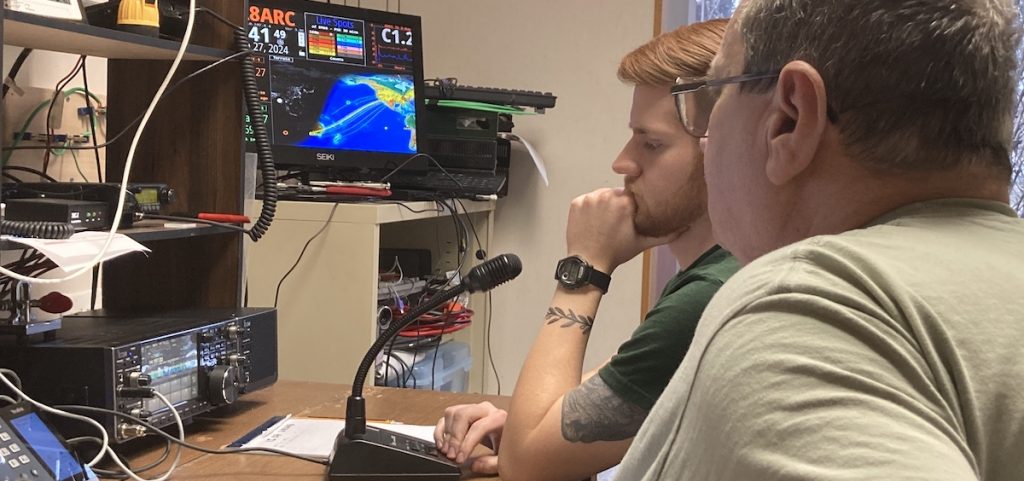The Athens County Amateur Radio Association finds that young people are still drawn to old-school communication
By: Gabriel Scotto
Posted on:
ATHENS, Ohio (WOUB) – Long before cell phones and the internet, ham radios were linking people around the world. And this old-school technology continues to fascinate hobbyists of all ages in the Athens County Amateur Radio Association.
“What really brought me into radio is the fact it’s such a unique hobby,” said Josh Senefeld. “Everyone uses (wireless communications) every day without even realizing it.”
Senefeld first became interested in the world of amateur radio at age 13 after he became a cadet in the Civil Air Patrol. Four years later, he got his amateur radio license.
Now 20, Senefeld is one of the younger members of the Athens County Amateur Radio Association, though it is open to people of all ages.
Founded in the mid-1970s, the association was intended to work in conjunction with U.S. civil defense agencies in times of crisis, as well as to promote the hobby and educate those who wish to become amateur radio operators.
“Our primary focus is supporting the Red Cross with emergency communications,” said Jeff Slattery, editor of the Athens County Amateur Radio Association’s newsletter. “If we had a local disaster (and) had to open up the Emergency Operations Center or maybe operate a shelter somewhere where the community was locked in from a flood, we’d have operators who’d be able to help with that.”
Ham radios consist of a small box with dials and a microphone that allows users to send and receive messages to other radio operators around the world. Unlike cell phones, these radios are not limited in what frequencies they can use, meaning radio communication is useful during emergencies when cellular networks are saturated or have failed. More importantly, radio stations can be set up in remote areas or places that have been cut off from existing communications networks.
“We can go somewhere and we can set up a temporary antenna and be able to contact just about anywhere in the world and operate on battery or solar power,” Slattery said.

“(Field days give) us an idea of how far we can reach from our station as well as keeping track of our contacts,” Slattery said.
Another service performed by the Athens County Amateur Radio Association is policing local amateur radio operators, who are often referred to by the nickname “hams.” Operating a radio without a license or in an improper frequency can result in a fine of $15,000 from the Federal Communications Commission. Other activities not permitted on amateur radio by the FCC include commercial broadcasts and broadcasting music.
“When we hear somebody that’s operating inappropriately or maybe in the wrong band for their licensed class, we’ll try to warn them (to) stay within (their) band parameters and those kinds of things,” Slattery said.
Other activities undertaken by members of the association include building antennas, receivers and transmitters, as well as going on “fox hunts,” in which members use radio direction finding techniques to locate hidden radio transmitters.
“There are some guys that have placed thousands and thousands of dollars into this,” Senefeld said.
Hams can be found across the globe. Famous amateur radio operators include the likes of late journalist Walter Cronkite and Hussein bin Talal, the former King of Jordan. Senefeld has communicated with operators in places as distant as the Czech Republic and Spain, while Slattery has reached out to hams in France and South Africa.
For the past six weeks, the club has been providing amateur radio license preparation classes at the Red Cross on Monday evenings. Those who attend can take a license test that covers such topics as radio frequency safety, FCC regulations and operating within the proper frequencies.
“The entry-level license is a 35-question test and it has about 10 different areas of concentration,” Slattery said. “We supplement the study materials with some hands-on practice.”
Radio frequency safety is an important aspect of the course, as improper radio operation can result in exposure to radio frequencies that damage human tissue.
“It’s not quite like a regular burn that you think of, but it can happen if you’re touching an antenna while it’s radiating,” Slattery said. “So we try to teach people to operate properly, make sure that their antennas are mounted where nobody’s going to be near them or touching them.”
One of the people currently working toward their amateur radio license is Ohio University student Dylan Armstrong, who also attended the Athens County Amateur Radio Association’s winter field day operations.
“I’ve always been interested in talking to other people, getting to know them and getting to understand them. I think it is the first and best step towards world peace,” Armstrong said. “I’ve also lived in times that have been very tumultuous and challenging, and I understand that it’s important to be able to communicate during emergencies. So ham (radio) just kind of was up my alley.”

